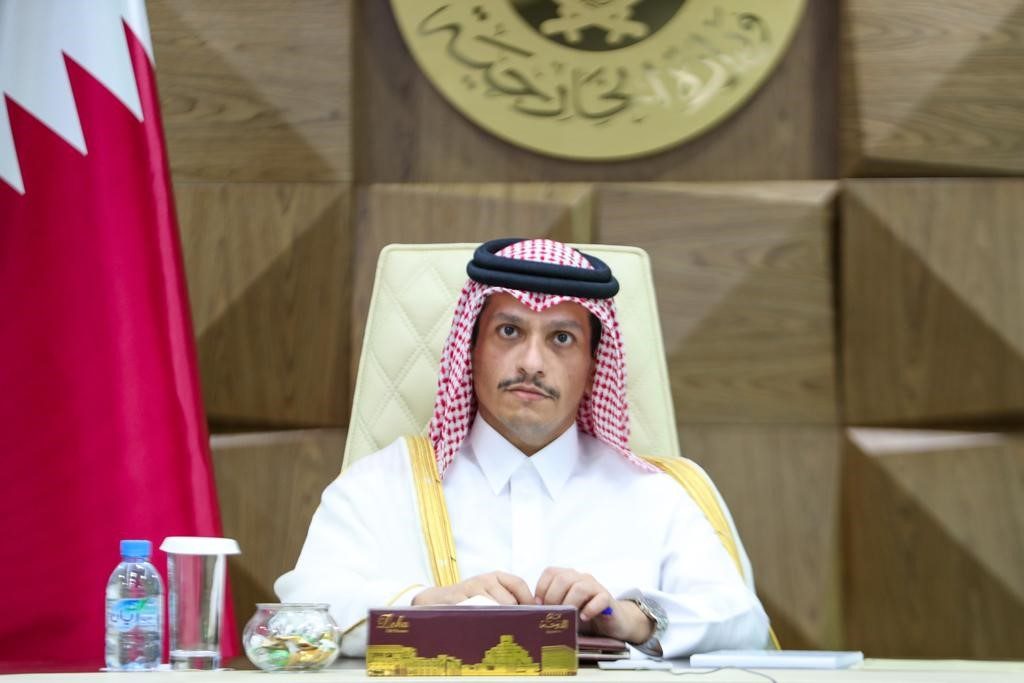Qatar’s PM and the UN Secretary-General discussed the escalating crisis in Gaza during a phone call, focusing on mediation efforts, humanitarian aid, and prisoner releases amid intensified Israeli attacks.
Qatar’s Prime Minister Sheikh Mohammed bin Abdulrahman Al-Thani and the United Nations’s Secretary-General Antonio Guterres discussed the latest developments in Gaza over the phone on Saturday amid intensified Israeli attacks on the Strip.
“During the call, they discussed developments in the Gaza Strip and the Occupied Palestinian Territories, especially the joint mediation efforts to end the war on the Strip, releasing prisoners and hostages, getting humanitarian aid sustainably into all areas throughout the Strip, in addition to the latest developments in the region,” Qatar’s foreign ministry said in a statement.
The call came as Israel launched deadly attacks across Gaza while forcibly displaced hundreds of thousands.
Israeli occupation forces have been throwing leaflets since Friday ordering people to evacuate from the central and eastern areas of Rafah to the city of Deir Al Balah.
People in Gaza are left with nowhere safe to go to, with many unable to secure a vehicle to transport them from one area to another.
The Israeli orders came after occupation forces invaded the vital Gaza-Egypt border, the Rafah Crossing, last week. The move completely blocked the entry of aid and stopped thousands awaiting urgent evacuation from leaving Gaza.
More than 100,000 people in Gaza have been forced to flee since the beginning of the attacks on Rafah, where more than one million people were sheltering after initial Israeli orders to evacuate the north last October.
The UN’s chief had warned of “an epic humanitarian disaster” if Israel launched a full-scale invasion of Rafah.
“A massive ground attack in Rafah would lead to an epic humanitarian disaster. The international community must speak with one voice for an immediate humanitarian ceasefire in Gaza, the immediate and unconditional release of all hostages, and a massive surge in life-saving aid,” Guterres said on May 10.
Hunger levels have already been on the rise, with 1.1 million people facing catastrophic levels of food insecurity, according to the UN.
Israel’s attacks on hospitals and prevention of the entry of basic resources also forced more than half of Gaza’s health facilities to go out of service. Currently, there are 12 partially functioning hospitals in Gaza out of an initial 36.
The relentless Israeli bombardments intensified since last week, targeting civilian buildings and temporary shelters.
On Saturday evening, Israeli forces launched fire belts on residential areas east of the Jabalia camp, with the exact toll still unclear.
Israeli forces also targeted the house of Al Jazeera journalist Anas Al-Sharif in the same area under a wider pattern of deliberate targeting of the press. Notably, the Israeli government passed a law to ban Al Jazeera from operating in areas occupied by Israel.
At least 19 people were also killed on Saturday night by Israeli air strikes on Deir Al-Balah in central Gaza and the Sabra neighbourhood in Gaza City.
Since October 7, 2023, Israel has killed nearly 35,000 people in Gaza while displacing more than 85 percent of the population of 2.2 million.
The figure includes 191 UN aid staff, 27 members of the Palestinian Red Crescent, 493 health workers, 69 civil defence staff, and 142 journalists.
The invasion of Rafah disrupted the ceasefire talks as they progressed after Hamas approved a deal presented by mediators Qatar and Egypt.
On Friday, Hamas said on its Telegram that the talks returned to “square one” and the group is reviewing its strategy at the negotiations.
“In the light of [Israel Prime Minister Benjamin] Netanyahu’s behaviour and rejection of the mediators’ document and the attack on Rafah and the occupation of the crossing, the leadership of the movement will hold consultations with the brotherly leaders of the Palestinian factions to review our negotiation strategy,” Hamas said.
The invasion of Rafah angered Israel’s main ally and backer, the United States.
In a rare move, Washington decided to pause the shipment of thousands of bombs to Tel Aviv including ones weighing 2,000 pounds (more than 900 kg).
Speaking to CNN on May 9, U.S. President Joe Biden publicly said he would halt the shipments of weapons to Israel if Netanyahu ordered a full-scale invasion of Rafah. He also admitted that American weapons were used to kill civilians in Gaza.
“Civilians have been killed in Gaza as a consequence of those bombs and other ways in which they go after population centres,” Biden told CNN’s Erin Burnett.
“I made it clear that if they go into Rafah – they haven’t gone in Rafah yet – if they go into Rafah, I’m not supplying the weapons that have been used historically to deal with Rafah, to deal with the cities – that deal with that problem,” he added.







